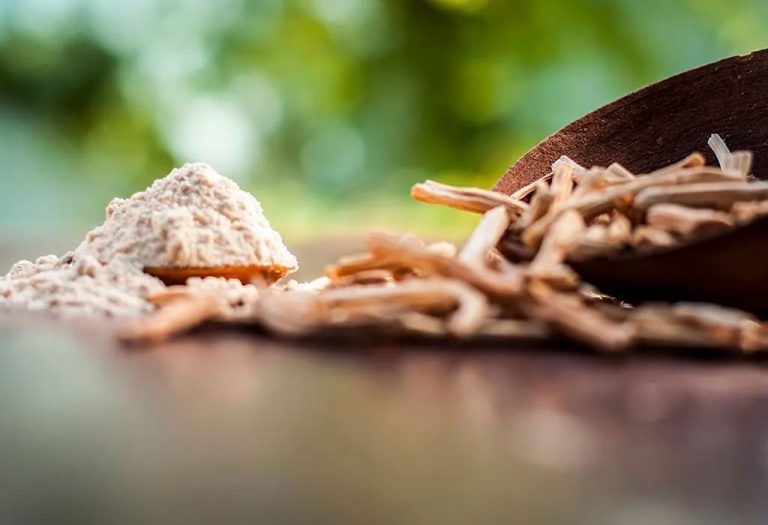Shatavari for Lactation – Does It Really Increase Breast Milk Supply?

A lactating mother needs to eat nutritious food so that her body produces enough breast milk to feed her infant. Some nursing mothers may be unable to produce adequate quantities of breast milk despite eating healthy. In such cases, a galactagogue is recommended. A galactagogue can increase the production of breast milk in nursing moms. Shatavari, an herb with a long history of use in traditional Ayurvedic medicine, has gained attention due to its purported ability to enhance breast milk supply. This article explores the scientific evidence surrounding Shatavari for lactation and its potential benefits and considerations for breastfeeding mothers.
What Is Shatavari?
Shatavari is also called wild asparagus. Its botanical name is Asparagus racemosus, a herb native to the Indian subcontinent. In India, it is mainly found in the Himalayas and is famous for its medicinal properties. Ayurvedic practitioners have used the herb for centuries to cure a range of health problems. Its healing and galactagogue properties make it a recommended herb for increasing breast milk production in nursing moms.
Let’s look at what Shatavari has that can improve lactation in nursing mothers and how it does so.
Constituents Available in Shatavari
Shatavari contains bioflavonoids, which are plant compounds with antioxidant properties. It can fight free radicals in the body that cause ageing and cell damage (5). The herb also contains hydrogenates that are beneficial for women’s reproductive system. Shatavari contains trace minerals essential for our bodies, such as zinc, manganese, selenium, potassium, copper, cobalt, calcium, and magnesium. This herb also contains vitamin A, vitamin B, and essential fatty acids (4).
How Does Shatavari Help to Boost Breast Milk Supply?
Shatavari is a well-known galactagogue. It increases the production of corticoids and prolactin, improving the quality and amount of breast milk a lactating mother produces. Shatavari also stimulates the secretion of steroid hormones that enhance milk production and increase breast weight. Thus, shatavari or wild asparagus for lactation is very beneficial (2).
So, is improved lactation the only health benefit of Shatavari? No, really. Read on to learn more.
Other Benefits of Shatavari for Breastfeeding Mothers
Ayurvedic practitioners recommend Shatavari for breast milk production. However, it has several other health benefits, and some of these include:
- Its antioxidant properties help improve the overall health of the nursing mother and fight ageing and cellular damage (6).
- Shatavari improves immunity and aids the body in fighting off infections.
- The herb is good for the digestive system (8). It can relieve diarrhoea, digestive tract inflammation, and heartburn.
- Shatavari also contains compounds that act as antidepressants. Thus, it can prevent postpartum blues or depression that often affect nursing mothers.
- It exhibits anti-inflammatory properties, offering relief from discomfort and swelling commonly experienced during lactation (3).
- It acts as an adaptogen (7), helping breastfeeding mothers manage stress levels, promote relaxation, and support overall well-being postpartum.
How to Use Shatavari Powder for Breast Milk?
Consult your doctor before using Shatavari powder to help increase breast milk. Get good-quality powder from a trusted place. About 1-2 teaspoons a day are recommended, mixed with water, milk, or a smoothie. Mix the powder with warm water or milk and have it on an empty stomach once or twice a day. Keep taking it regularly and watch for changes in your milk supply or how you feel. Drink plenty of water and eat healthy to stay strong. If any problem persists, stop using it and talk to your doctor.
Recommended Dosages of Shatavari
If you wonder how much shatavari should I take for breastfeeding, the answer is: Although Shatavari has several health benefits, it should not be consumed without consulting an expert. The expert will diagnose the condition before prescribing it and recommend dosages accordingly.
Shatavari can be consumed in various forms. The two primary forms of Shatavari commonly used are capsules and powder.
1. Capsules
Ayurvedic practitioners commonly recommend Shatavari capsules for lactation. The commonly prescribed dosage is 500 to 1000 mg of Shatavari extract per day.
2. Powder
Doctors often recommend the powder form of Shatavari Kalpa for breast milk. The suggested dosage is 3-6 g per day, taken with warm milk or water and honey.
What Is Better Among Powder and Capsules?
Tasting the Shatavari herb somehow increases its activity and stimulates a better response in the body. Hence, the powdered form of the herb is preferred. The powder form is also less expensive than capsules.
However, many find it easy to consume capsules, particularly because they do not like the bitter taste of Shatavari. The powdered form tastes bitter, and honey reduces the bitterness.
Below are some more ways you can consume the powdered form of Shatavari.
Are There Any Other Ways to Consume Shatavari?
These tips will help you consume Shatavari and reap its health benefits.
- Herbal Paste or Jam: Shatavari is available in the form of paste or jam (Shatavari Gulam), which makes the taste a bit bearable and also makes the herb easy to consume.
- Ghee: Shatavari can be boiled with clarified butter to make medicated ghee. Lactating mothers can consume this ghee to increase their breast milk production.
- Churna: A churna is an Ayurvedic mix of minerals and powdered herbs. Shatavari is also available as a churna.
One question that comes up repeatedly is whether a certain ingredient or herb has side effects. Let’s find out if Shatavari could have side effects.
Are There Any Side-Effects of Consuming Shatavari While Breastfeeding?
Research has found that Shatavari is non-toxic and completely safe for both lactating mothers and their infants. It is safe and does not cause adverse reactions in breastfeeding moms or their babies (1). However, it is better to consult your gynaecologist for its long-term use.
It would help if you took precautions, which we shall discuss in the next section.
Precautions to Take Before Consuming Shatavari
Nursing mothers must take precautions before consuming Shatavari. Some of these are –
- If you are allergic to asparagus, Shatavari is better avoided. Symptoms of an allergy include skin rashes and breathing problems.
- Shatavari is a diuretic and can cause you to urinate frequently. If you are already taking diuretics, you should avoid this herb.
- This herb is heavy and oily in nature. It increases ”kapha” in the body, which plays a role in lubrication. If you have issues like congestion, avoid taking Shatavari.
- As this herb contains plant oestrogens, it can affect women who have oestrogen sensitivity. It could cause weight gain and breast enlargement or tenderness.
FAQs
1. How long does it take to see results when using Shatavari for lactation?
The time it takes to see results can vary from person to person. Some individuals may notice increased breast milk supply within a few weeks of consistent use, while others may take longer. It’s essential to maintain regular usage and monitor your response.
2. Can Shatavari be used alongside other lactation supplements or medications?
Consult a doctor before combining Shatavari with other lactation supplements or medications to ensure compatibility and safety. Your doctor can provide personalised recommendations based on your needs and medical history.
3. Can Shatavari be taken during pregnancy to prepare for breastfeeding?
While Shatavari is traditionally used to support female reproductive health, including lactation, it’s crucial to avoid its use during pregnancy unless specifically recommended by a doctor. Pregnant women should consult with their doctor before taking any herbal supplements.
Shatavari for lactating mothers is believed to aid in boosting breast milk supply. However, it must be taken regularly for a few weeks to produce noticeable results. Although the herb is naturally available and accessible, you must consult your doctor before consuming it.
References/Resources:
1. Birla. A, Satia. M, Shah. R, Pai. A, Srivastava. S, Langade. D; Postpartum Use of Shavari Bar® Improves Breast Milk Output: A Double-Blind, Prospective, Randomized, Controlled Clinical Study; Cureus; https://www.ncbi.nlm.nih.gov/pmc/articles/PMC9375125/; July 2022
2. Wild Asparagus; Drugs and Lactation Database; https://www.ncbi.nlm.nih.gov/books/NBK501813/
3. Alok. S, Jain. S. K, Verma. A, Kumar. M, Mahor. A, Sabharwal. M; Plant profile, phytochemistry and pharmacology of Asparagus racemosus (Shatavari): A review; Asian Pacific Journal of Tropical Disease; https://www.ncbi.nlm.nih.gov/pmc/articles/PMC4027291/
4. Negi. J. S, Singh. P, Joshi. G. P, Rawat. M. S, Bisht. V. K; Chemical constituents of Asparagus; Pharmacognosy Review; https://www.ncbi.nlm.nih.gov/pmc/articles/PMC3249924/
5. Mishra. J. N, Verma. N. K; ASPARAGUS RACEMOSUS: CHEMICAL CONSTITUENTS AND PHARMACOLOGICAL ACTIVITIES-A REVIEW; European Journal of Biomedical AND Pharmaceutical sciences; https://www.researchgate.net/publication/319007272_ASPARAGUS_RACEMOSUS_CHEMICAL_CONSTITUENTS_AND_PHARMACOLOGICAL_ACTIVITIES-A_REVIEW; June 2017
6. Singh. L, Kumar. A, Choudhary. A, Singh. G; Asparagus racemosus: The plant with immense medicinal potential; Journal of Pharmacognosy and Phytochemistry; https://www.phytojournal.com/archives/2018/vol7issue3/PartAD/7-3-162-671.pdf
7. Attar. U, Banger. R, Avhad. P; REVIEW ON SHATAVARI; International Journal of Novel Research and Development; https://www.ijnrd.org/papers/IJNRD2301305.pdf; January 2023
8. Dahiya. L, Sharma. R, Sharma. S; A Broad Review on Shatavari (Asparagus racemosus): Queen of All Herbs; Journal of Palliative Care & Medicine; https://www.omicsonline.org/open-access/a-broad-review-on-shatavari-asparagus-racemosus-queen-of-all-herbs-120474.html
Also Read:
How to Increase Fat in Breast Milk?
Lactation Supplements Every Mother Should Take
Recipes for Breastfeeding Mothers to Boost Lactation
Fenugreek (Methi) and Breast Milk Supply – Does It Really Help?
Was This Article Helpful?
Parenting is a huge responsibility, for you as a caregiver, but also for us as a parenting content platform. We understand that and take our responsibility of creating credible content seriously. FirstCry Parenting articles are written and published only after extensive research using factually sound references to deliver quality content that is accurate, validated by experts, and completely reliable. To understand how we go about creating content that is credible, read our editorial policy here.



































